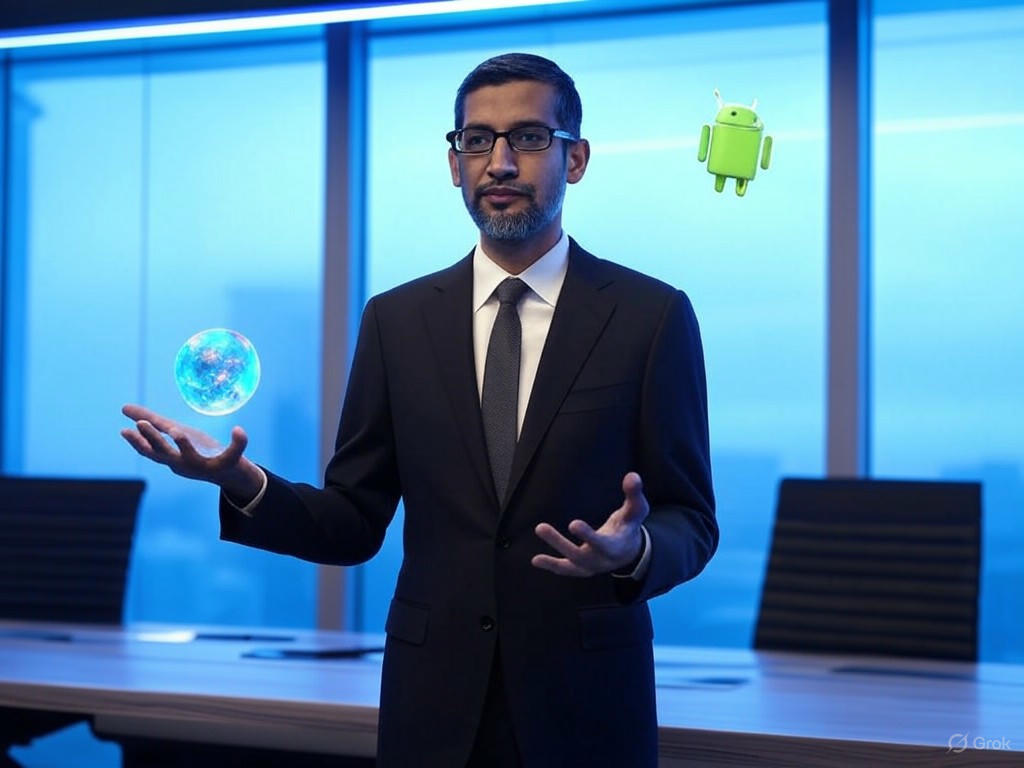
Google Antitrust Proposals Threaten Google’s Business, Pichai Warns
Google Antitrust Battle: Unprecedented Challenges from DOJ Proposals
In the heart of the Google antitrust saga, CEO Sundar Pichai has raised serious alarms about the U.S. Department of Justice’s aggressive plans. This stems from Judge Amit Mehta’s August ruling that labeled Google’s search operations as a monopoly, pushing the case into a remedies phase that could upend the tech giant’s $1.8 trillion empire. It’s fascinating to think about how these moves might reshape how we all use the internet every day.
The DOJ’s suggestions, which Google calls overly broad, involve selling off Chrome, sharing critical search data with rivals, and scrapping default search deals with companies like Apple. This Google antitrust probe isn’t just about big business—it’s about the everyday tools billions rely on, like quick searches and seamless browsing. Have you ever wondered what life would look like without Google’s dominance in these areas?
DOJ’s Proposed Remedies: A Potential Dismantling of Google
These remedies from the DOJ represent some of the boldest antitrust actions against a tech firm in years, targeting the very foundations of Google’s operations. They break down into key areas that could force major changes, making this a pivotal moment in the Google antitrust debate.
For instance, if implemented, these steps might open the door for more competition, but at what cost to innovation and user experience?
Chrome and Android Divestiture
One of the most striking proposals is mandating the sale of Chrome, Google’s popular browser where it pours over a billion dollars yearly into development. Pichai pointed out during testimony that no other player matches this level of investment, highlighting how central Chrome is to Google’s ecosystem. In the context of Google antitrust efforts, this could mean breaking ties that keep services integrated and secure.
The DOJ also wants to limit Android’s ability to favor Google Search by default, potentially splitting the operating system from its core features. This shift in the Google antitrust landscape might change how you pick your search engine on your phone, forcing device makers to offer more choices upfront.
Search Data Sharing Requirements
Another contentious idea is compelling Google to share its proprietary search data with competitors at a minimal cost. Pichai expressed deep concerns, noting that rivals could essentially replicate Google’s tech stack. For the Google antitrust case, this raises questions about protecting years of innovation and the investments that fuel it.
He argued that giving away such data at marginal cost would undermine Google’s intellectual property, making it tough to justify future spending on search advancements. It’s a classic dilemma in Google antitrust discussions: balancing competition with the need to reward creators.
Default Search Agreement Prohibitions
The DOJ aims to outlaw Google’s deals that set it as the default search on devices and browsers, deals that have long been a cornerstone of its strategy. These agreements were key in the original ruling, painting them as tools of monopoly in the Google antitrust framework. Without them, companies like Apple might have to rethink their partnerships entirely.
Google Antitrust Testimony: Pichai’s Warnings on Privacy and Innovation
On April 30, 2025, during the remedies phase, Pichai took the stand to outline the risks of these proposals, zeroing in on privacy threats and the broader impact on tech progress. His insights add a human element to the Google antitrust narrative, reminding us that policies affect real people.
For example, if you’re someone who searches for personal health advice, the potential exposure of that data is alarming.
Privacy Vulnerabilities
Pichai stressed that forcing data sharing could expose users’ most sensitive information to less secure entities. People often turn to Google in vulnerable moments, and without robust protections, this could lead to misuse by bad actors. In the Google antitrust context, it’s a stark reminder that breaking up ecosystems might compromise the privacy safeguards we’ve come to expect.
He described the proposal as akin to a full divestiture of Google’s R&D efforts, potentially handing your private queries to unfamiliar companies. What if your search history ended up in the wrong hands—just think about the implications for everyday users.
Innovation and Economic Implications
Beyond privacy, Pichai highlighted how these changes could slow U.S. innovation amid global competition, especially with China. As a leader in AI and tech breakthroughs, Google plays a key role, and disrupting that could have wide-reaching effects in the Google antitrust arena. He warned that fragmenting services might hike costs for consumers, turning free tools into paid ones.
This isn’t just theoretical; it could mean higher prices on devices or less secure online experiences. In navigating Google antitrust challenges, businesses might need to adapt quickly to maintain their edge.
Google’s Alternative Remedies Proposal
Back in December 2024, Google offered its own set of remedies, designed to address the court’s concerns without overhauling the company. This counterproposal focuses on flexibility and fairness, providing a more measured approach to the Google antitrust issues at hand.
It’s like offering a middle ground in a heated debate, where both sides can find commonalities.
Browser Agreement Modifications
Google suggested letting browser makers form deals with various search engines, with options to switch defaults every 12 months. This would keep partnerships alive while introducing competition, acknowledging that Google’s search quality often stands out. In the Google antitrust discussion, this could ensure revenue streams for partners like Mozilla without dismantling the system.
Android Contract Adjustments
For Android, the plan includes giving manufacturers freedom to preload multiple search engines and apps independently. This might give rivals like Microsoft a fair shot at visibility, aligning with the spirit of Google antitrust reforms. Essentially, it’s about creating opportunities without forcing a breakup.
Oversight Mechanisms
Google’s idea includes built-in checks to ensure compliance, without handing excessive control to regulators. This balanced oversight could prevent overreach, keeping user experiences intact amid Google antitrust pressures.
Implications for the Digital Marketing Landscape
The Google antitrust case could ripple through digital marketing, affecting SEO strategies and ad campaigns in profound ways. If Google’s grip loosens, marketers might have to rethink their approaches to reach audiences effectively.
For instance, if more users switch to alternatives, your next campaign could look very different.
Potential SEO Changes
With users facing more search engine options, Google’s market share might dip, potentially boosting players like Bing. In the Google antitrust evolution, this means SEO experts could diversify, optimizing for multiple platforms to hedge their bets. It’s a smart move—after all, who wants to put all their eggs in one basket?
Competitive Landscape Shifts
Pichai noted the rapid changes in AI, with tools like ChatGPT leading the charge, signaling a dynamic Google antitrust environment. He mentioned upcoming integrations, like Gemini with Apple, which could foster more openness. This shift might inspire marketers to explore new tech trends for better engagement.
The Path Forward: Timeline and Next Steps
The trial is set to wrap up in three weeks, with Judge Mehta deciding on remedies that could set precedents for other tech firms. Google plans to appeal, but first, this phase will define the immediate future in the Google antitrust story. Keep an eye on how these developments unfold—they could affect everything from your daily searches to global tech policies.
Conclusion: A Watershed Moment for Big Tech
This Google antitrust case marks a turning point for how we regulate tech powerhouses, with potential remedies that could forever alter the industry. Pichai’s defenses underscore the high stakes, from privacy risks to economic shifts, making it a must-watch scenario. As you reflect on these changes, consider how they might influence your online habits or business strategies—what are your thoughts on balancing competition and innovation?
To dive deeper, check out our related posts on digital trends, and we’d love to hear your insights in the comments below. Feel free to share this article or explore more on antitrust topics—let’s keep the conversation going.
References
1. Google’s official response on DOJ search remedies. Source: Google Blog, blog.google/outreach-initiatives/public-policy/doj-search-remedies-apr-2025/
2. Department of Justice prevails in landmark antitrust case. Source: U.S. Department of Justice, www.justice.gov/opa/pr/department-justice-prevails-landmark-antitrust-case-against-google
3. Google’s remedies proposal. Source: Google Blog, blog.google/outreach-initiatives/public-policy/google-remedies-proposal-dec-2024/
4. Alphabet CEO Pichai testifies in antitrust case. Source: Business Insider, www.businessinsider.com/alphabet-ceo-pichai-testifies-antitrust-case-warns-privacy-risks-2025-4
5. Upset Google CEO calls U.S. government proposal extreme. Source: Times of India, timesofindia.indiatimes.com/technology/tech-news/upset-google-ceo-sundar-pichai-calls-us-government-proposal-to-break-google-so-far-reaching-so-/articleshow/120782079.cms
6. Digital marketing implications of Google antitrust verdict. Source: Outerbox Design, www.outerboxdesign.com/articles/digital-marketing/google-antitrust-verdict
7. Sundar Pichai warns of consequences against breaking up Google. Source: American Bazaar Online, americanbazaaronline.com/2025/05/01/sundar-pichai-warns-consequences-against-breaking-up-google-462367/
8. DOJ proposes banning Chrome and Android. Source: SERoundtable, www.seroundtable.com/doj-chrome-android-ban-google-38452.html
Google antitrust, DOJ remedies, Sundar Pichai testimony, Chrome divestiture, search monopoly, Google privacy concerns, antitrust case, Google breakup, digital marketing impact, AI competition





